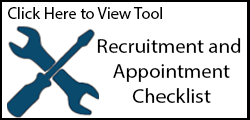Recruiting and Appointing Community Workgroup Members
Recruitment
When recruiting community members for workgroup involvement, government staff must seek community members, actively finding them through the methods they seek information and where they are in public spaces. Recruitment must be active instead of passive. We must find and meet people where they are, and not expect them to come to you. Too often, information about a new workgroup soliciting new member applications can only be found in an agency’s newsletter or deep within their website.
Ask yourself – are community members with lived experience likely to subscribe to GovDelivery emails from large state agencies? Would they be actively searching your website and come across information about the workgroup? If the answer is no (and it will almost always be no!) it is the responsibility of the workgroup manager to develop a recruitment strategy to reach people through avenues of communication that work for them.
GovDelivery and agency websites are starting point (and are great methods to recruit with already connected agency allies and affected organizations) but should not be the end of your recruitment efforts. You may be able to get guidance from the consulting state entities or your agency equity director to assist in your recruitment efforts.
Designing an Application
Create the application with the end user and result in mind. What process best meets their needs and what applications and tools they have access to?
- DON’T request burdensome cover letters or resumes that create extra labor for community members who may already be stretched thin.
- DO use a secure form or survey collection tool for the application instead of having applicants download a PDF which requires them to have the software and specialized knowledge to edit, save, and email back to you. The Office of Equity frequently uses Smartsheet for surveys and forms like this, but your office may have another preferred tool.
If, through your landscape analysis, you discovered that the people in your workgroup are more likely to include those who may speak a primary language(s)other than English, translate the application and other relevant materials into the primary language(s) of the group beforehand (whether or not anyone has made a formal translation request). Be prepared to receive and request translation back to English from applicants who apply in another language. In addition, verify that all forms are accessible for applicants who use assistive technology (such as a screen reader). Do not rely only on machine translations (google translate) without use of a qualified human reviewer to ensure quality, context, and relevancy of translated materials.
Use the template below as a foundation for developing your application form.
A Note on Privacy:
Sensitive, Personal, or Potentially Stigmatizing Information
Protecting applicants’ privacy is a paramount concern. DO NOT collect any sensitive personal information on the application form. Sensitive information could include questions or attestations about the applicant’s lived experience regarding issues that are often personally stigmatizing or traumatizing. For example, a workgroup aiming to build strategies to address the Fentanyl crisis may have community members apply who have a history of substance use disorder or a workgroup about the LGBTQ community might want applicants with lived experience to self-attest to their sexual orientation. Collecting that data, even if your agency or staff would never use it against someone, could still be harmful in the event that a Public Records Act request collects that information or in the event that the federal government or another third-party subpoenas or seizes data from state agencies.
Basic Contact Information
Basic contact information of volunteers IS protected under RCW 42.56.250 which states that:
“(1) The following employment and licensing information is exempt from public inspection and copying under this chapter:
(d) The following information held by any public agency in personnel records, public employment related records, volunteer rosters, or included in any mailing list of employees or volunteers of any public agency: Residential addresses, residential telephone numbers, personal wireless telephone numbers, personal email addresses, social security numbers, driver's license numbers, Identicard numbers, payroll deductions including the amount and identification of the deduction, and emergency contact information of employees or volunteers of a public agency, and the names, dates of birth, residential addresses, residential telephone numbers, personal wireless telephone numbers, personal email addresses, social security numbers, and emergency contact information of dependents of employees or volunteers of a public agency. For purposes of this subsection (1)(d), "employees" includes independent provider home care workers as defined in RCW 74.39A.240”
All demographic data that could be used by malicious individuals or institutions should be captured in a truly anonymous approach, without unique identifiers that someone could use to associate this with an individual's name, phone number, email address, place of business, home address, and the obvious Category 3/4 data such as Social Security number (SSN), Date of Birth (DOB) etc. Consult with your agency’s assistant attorney general (AAG) before requesting demographic or other sensitive personal or identifying information.
The Office of Equity strongly recommends that you collect only the minimum required information on the written form, and only ask questions about stigmatized or marginalized identities and experiences during the face-to-face interview stage to avoid creating a written record of sensitive information.
Interview and Appointment
Once you have a pool of candidates who have applied, a face-to-face interview (whether in person or virtual) is required. In your face-to-face interview, you can freely discuss the candidates’ lived experience and their connection to the subject matter. You can also get a sense of their experience, communication style, and personality in a way that written applications often miss, which ensures that you are not excluding individuals with less advanced written language proficiency. The consulting state entities may be available to support you by participating in the interview process or supporting you in making final candidate decisions.
Anyone working for a state agency who is actively involved with the community member recruitment and selection process should be well-versed in identifying and eliminating bias competencies. Identifying and dismantling personal bias is necessary for conducting a fair recruitment and appointment process.
- Note: DES is currently developing an unconscious bias training, which will be linked here upon availability.
After all interviews have been completed and the decision has been made about who to appoint, email all applicants (including those who are not selected) to inform them of the decision.
Your agency may choose to issue a formal appointment letter signed by the director and sent via paper mail to those selected to participate on the workgroup. This type of letter is optional, but the formality can be a nice touch and something that instills pride, excitement, and a sense of achievement for new workgroup members. It is also something they can include on their resume and show to future employers.
Back | ToolKit Home | Next


